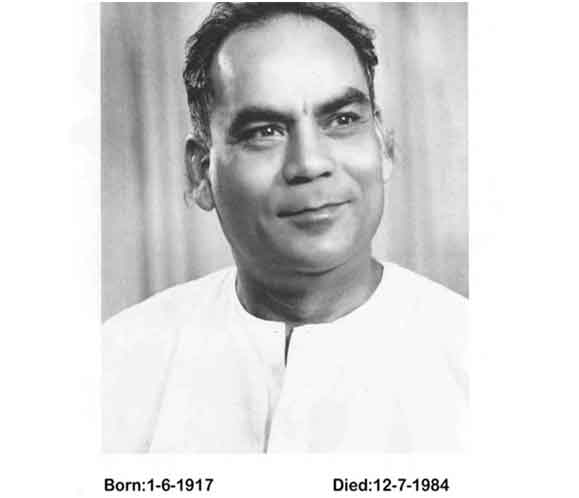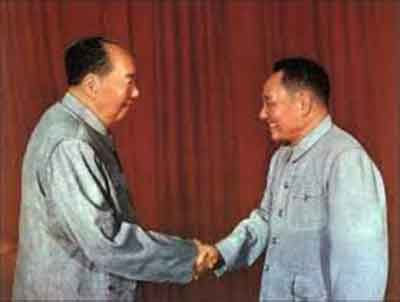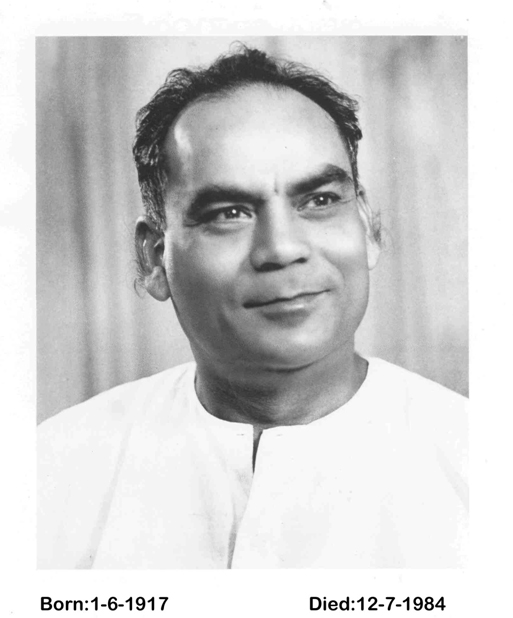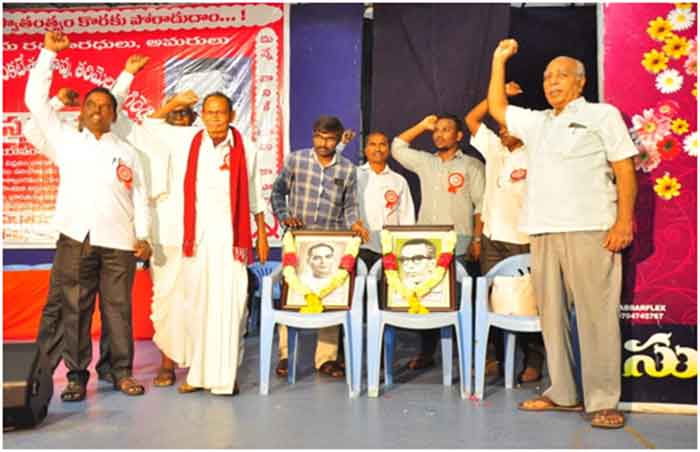
A memorial meeting, remembering Com DV and TN was held in Khammam town of Telangana State on July27, 2022.
Hundreds of people who are fighting for and supporting agrarian revolution attended, including a big number of adivasi and poor peasants, and large number of women. The meeting held in the peak of rainy season went on from10.30 am to 5pm (with 30-minute lunch-break), speakers explaining the revolutionary politics, current politics and ongoing struggles. Far left are adivasi and poor pesant leaders, Muttayya and veteran fighter Padiga Yerraiah (President of Grameena Pedala Sangham of rural poor). Far right is Dr. Jatin Kumar, OPDR leader from Telangana.
Currently struggles of adivasi and poor and landless peasants for podu (forest lands),who occupied and tilled thousands of acres and demanding pattas (legal rights) as per Forest Rights Act , 2006,are going on in various parts of Telangana.
Speakers asked if the newly-elected President Draupadi Murmu, born and projected by Modi-led BJP as adivasi herself will stand by the rural poor fighting for their land and democratic rights.
T.Nagi Reddy died 46 years ago on July28,1976, and DV Rao died on July12, 1984. Every year in July, meetings, small and big, are held across Telangana and Andhra Pradesh by UCCRI-ML remembering the revolutionary mass line they founded, and reviewing struggles along that line. The above is one such well-attended meeting (see photos below)
countercurrents.org has a rich archive on the lives and work of Comrades TN and DV: see at the end of the article for more.
*** ***
July 28, 1976 was the day when veteran communist revolutionary leader Com TN(1917-1976), as he was called, died of a sudden illness when he was not even 60. It was the period of Internal Emergency proclaimed (on 1975 June 26) by Mrs. Indira Gandhi’s regime, a watershed in India’s political history. He along with his comrade-associate DV Rao(1917-1984July12) known for his stellar role in Telangana People’s Armed Struggle 1946-51) had jumped bail—they were earlier convicted by a Special Court on charges of Conspiracy and Sedition to overthrow the Govt, and went in Appeal to the High Court of Andhra Pradesh against the verdict –and slipped into underground life in July 1975.
The UCCRI (ML) was co-founded by them in April 1975 only to be banned three months later by the Govt in July 1975. They were trying to cope with the new situation of Constitutional autocracy when TN got into a sudden, brief illness and died incognito in Osmania General Hospital, Hyderabad, on July 28. It is 46 years since he died but TN and DV are remembered every year in meetings held in Andhra Pradesh and Telangana , where their revolutionary mass line is pursued, with a thrust on agrarian revolution, as part of people’s democratic revolution aimed against imperialism, big-comprador bourgeoisie and landlord classes.
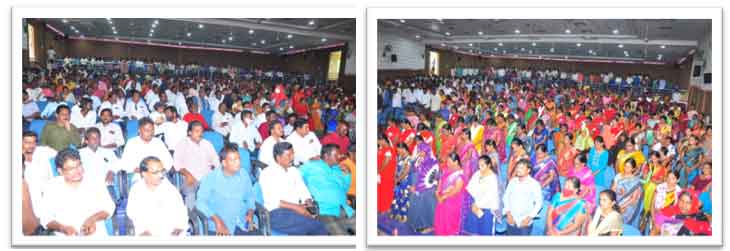
*** ***
Com TN, his college days in BHU, Gandhi and Nehru
The following are excerpts from an interview given by comrade TN, 1975, June-July, one year before he died on July 28, 1976. Some incidents of Comrade TN’s college life are covered here. They are of interest as India celebrates its Azadi ka Amrit mahotsav, 75years of independence. Idelogical struggle between the Left and communist students and the communal RSS wing in BHU feature in this story, reported by the then media leaders, Gandhian Indian Express versus Nehruite National Herald, taking sides.
Now the Text of the interview follows:
Any details of your life in LoyolaCollege, ( Chennai) for two years?
Yes. Not happy but quite bitter. On the very first day of class, the opening of the College, I had a small clash with the very first Professor that came to address my class. As a student of Theosophical and Rishivalley Schools, I was not in the habit of artificial respectfulness to any Professor or teacher. With the result that it did not enter my head that I should stand up when a Professor enters the class-room. Not being in that habit, I failed to notice the others standing when the Professor entered the class-room. 1 was admonished for it. I was asked as to where I had studied previously. When I told them that I came from Theosophical and Rishi Valley, the Professor very curtly said to me that I should learn better manners from now onwards. Therefore my very first impression of the college was not favourable to them. From then on, I had serious clashes, sometimes open, sometimes implied, with the administration of the college.
I was fined quite a number of times, for such reasons as having attended a public meeting addressed by Jawaharlal Nehru, for having participated in that famous Satya Murthy versus Ramaswamy Mudaliyar election campaign, and for producing some essays of history , which were not in conformity with the teaching of the Professors. One instance stands out which would have had an extremely voracious effect if I had bowed down to them.
Essay on Mohammad Bin Tughlak
During the second year of the College life, i.e., Intermediate (1932-33), the class was asked to write an essay on Mohammad Bin Tughlak during the holidays. I was angry when the Professor used to make harsh remarks that Mohammad Bin Tughlak was mad. As a Nationalist at that time, I was not prepared to take their verdict as correct. Therefore, I purchased quite a number of books relating to that historical period and with the help of Eswar Prasad’s Medieval History of India, I produced an essay characterising Mohammad Bin Tughlak as a man of genius, born long before the times, establishing the fact that he was a great economist and therefore produced coins in leather and not in metal (historically criticising the paper currency now in vogue), characterising him as a military genius of having thought of transferring the capital of India from Delhi which is prone to attacks from outsiders to a place more centrally situated. Therefore less attacks from enemies, along with quite number of other important characteristics of Mohammad Bin Tughlak to explain and naturally that he was a genius and not mad as imperialist historians have distorted. Having gone through that essay, he criticised me in the class and asked me to produce a different essay as per the teaching in the class. I refused, therefore I was fined Rs. 507. I have made a report to my father (who was a Congress leader of Andhra’s Anantpur dt., then part of composite Madras province) ahead of a report from Father Vian, the Principal. My father wrote a letter to the administration saying that the boy is never indisciplined as they have called him and that he is sending Rs. 50/- by Money Order to clear the fine that has been imposed on me. That is only one of the many instances that occurred during that period.
Jawaharlal Nehru’s public meeting
Any other instance?
There is one more instance at Loyola. I was one of those students who kept very meticulously to the discipline of the college. After the college hours, we were expected back in the hostel by 9 p.m. In between that period, i.e., 5-00 p.m after the college is closed and 9 p.m., we had certain amount of freedom to move about. One day I had gone to the Marina Beach to hear Jawaharlal Nehru’s address in a public meeting. Remembering the college discipline I left the meeting even before it was over to be back again in the hostel in time. Catholic Wardens, knowing that Jawahar Lal Nehru will certainly attract a few of the nationalist-minded students in the hostel, kept vigilance over our activities. They asked me as to where I had been. I truthfully told them that I had attended the public meeting addressed by Jawaharlal Nehru. Immediately a fine was imposed. The others who had come along with me had escaped the fine because they told the Principal that they had been to the first show of a picture. Such instances as these angered me to a certain extent that I was in a half mind to leave the college immediately. But my father convinced me by telling me that I need not bother as to what the authorities do in relation to my activities which were not in any way hindering my studies in the college and violating the discipline of the college. With this experience I decided that I would no more enter that college again after examinations. With the result that my next college life began in Benarus Hindu University. In Loyola College I was not permitted to have my ‘Charka’ in my room.
Benarus Hindu University where Communists and terrorists had a place
Who advised you to go to Benarus Hindu University?
1 should say none. As a matter of fact even when I went to Loyola College, I was interested in going to Benarus but then my father came in my way and promised to send me to Benarus after completing my Intermediate, and of the colleges in Madras, I was told at that time, that Loyola was one of the very best, but then I had not known that Loyola was so anti-national in its activities.
What were your first impressions of the Benarus Hindu University?
I do not remember any now.
Do you remember any of your lecturers there?
Yes, a few of them.
Do you remember Achyut Patwardhan?
No.
I remember Prof. Gurumukh Nihal Singh of the Politics Department, Prof. Mukid Bihar Lai, Politics Dept, Prof. BP Adarkar of Economics Dept., Prof. Aswani, Department of Physics, Warden of ‘A Block, (Hostel), Dr. C. N. Menon of English Department and Prof. Subramanyam of the Law College. Benarus Hindu University was responsible for completely re-orienting my political and economic views. Probably it was the greatest turning point in my personal and political life. It was the place which produced quite a number of friendships which remained last to this day. It served to help me study seriously various political and economic theories to finally come to the conclusion at the fag end of my study in Benarus that Communism and Communist Party alone can save this country from the Imperialist exploitation.
Benarus Hindu University was at that time a place wherein all politically-oriented students from various parts of the country belonging to various political philosophies and parties gathered together, both to complete their academic studies and also to gain nationalised political knowledge. Benarus Hindu University of that period was a political centre wherein leaders of various parties openly and surreptitiously made the students interested in political activities and that way it was a centre of activity of different views of nationalist movements in our country. Gandhists, Nehruists, Congress Socialists, Communists and Terrorists had a place in that University.
Gandhian TN turned Communist
Leaders of all these parties openly and secretly (as in the case of Communists and Terrorists) visited the University very often. It was an experience, which probably is not available today in any place in our country. At that period students of various political philosophies had an extremely bitter controversial discussions on various aspects of political life. Polemics was the order of the day. At the time of entering the University, I was a convinced Gandhist. On my way to Benarus Hindu University along with Mr. Kalluri Subba Rao, who was one of the doyens of the political leaders of our State, visited Sevagram near Wardha to see Gandhiji. From the Ashram I had even a Charka to Benarus Hindu University to continue my spinning. So I entered Benarus Hindu University as a convinced Gandhist, and during the four or five years I studied there, I was influenced by the Congress Socialists namely Kamaladevi Chattopadhyaya, Jaya Prakash Narayan, Achyut Patwardhan and others, and from there on to the Communist party in course of time. It was in Benarus Hindu University that I came to know of Marx and Marxism, it was in Benarus Hindu University that I came to understand the importance of the Russian Revolution and its political leadership of Lenin and Stalin, it was in Benarus Hindu University that for the first time I came to know that Marxism can be applied to Indian conditions. Surprisingly Jaya Prakash Narayan’s socialism played an important role in understanding this aspect. Later Jawaharlal Nehru’s address to the Lucknow Congress wherein he made specific mention of the treatises of Soviet Communism, written by famous Sydney and Beatrice Webbs, almost finally completed the process of transmission from Gandhism to Communism. It was during this period, that I came into personal contact with two of my student friends, S.P. Tripathi and Rustum Satin, who helped me to get certain literature of the Communist Party to go through. It was during this period that Comrade Bharadwaj, who was a responsible Communist leader, in charge of the student unit in Banarus, came into contact with us. It was again during this period that I was lead to read quite a number of books produced by Left Books Club of London, especially those by John Strachy – Theory & Practice of Socialism, ‘The coming struggle for power’ — and Palme Dutt, especially his classical book ‘World Politics’.
The Spanish Civil War, one of the most important international incidents that took place during that period played an extremely significant role on the minds of the youth of the day. The self-sacrificing role of the Communists in that Civil War influenced me at that time. Added to all this, there was an important Telugu personality in the University, Kalipatnapu Kondaiah, M.Sc., Prof of Chemistry; he in his own silent manner influenced me in my study to understand world politics in a scientific process. During this period our political life was extremely active, undergoing a series of changes analysing every aspect of the Nationalist movement in a manner which probably never took place later. Quite a number of old concepts were demolished here. Benarus Hindu University was a politically strong centre during the period which did create and extend new political horizons.
As the President of BHU’s Students’ Association
Why were you thrown out of the University?
In 1939 I happened to be the President of the Benarus Hindu University Students’ Association, the first Andhra to be elected. During that period national upsurge among the students was growing. The Congress had passed a resolution demanding a Constituent Assembly. There was quite a hectic political life mainly on the question of the Constituent Assembly itself.
Sir Marz Grower, Vice-chancellor of the Delhi University, was invited to deliver the Convocation Address in Benarus Hindu University. We, on behalf of the Students Union, had opposed the invitation to him by the University on the ground that he would deliver an address which would against our National sentiments. We had given a call for the boycott of the Convocation by the students. Dr. Radha Krishnan (later the President of India) was the then Vice Chancellor of Benarus Hindu University. Seeing that our call had a great impact on the students, he contacted us, and told us that it was not his invitation that was responsible for Sri Marz Grower’s visit to the University but that Gandhiji recommended his name for the same. Therefore, he requested us that we should withdraw the appeal for boycott of the Convocation. On an understanding with him that Sir Marz Grower would not transgress into fields which would hurt the national sentiments of the students community during the course of the Convocation Address, we on our part withdrew our appeal to the students to boycott the Convocation. So the Convocation took place peacefully. Taking advantage of the situation, Sir Marz Grower came out very strongly against the slogan of the Constituent Assembly with quite a number of historical untruths. This naturally angered us. Immediately after the Convocation address we produced an extremely educative leaflet on Constituent Assembly putting forth the historical data that Constituent Assemblies in world history had played an extremely important role in various revolutions, including the American Revolution. I, as the President of the Students Union, had signed the leaflet which was issued under my name. This leaflet was posted to Sir Marz Grower with a personal letter from me as the President of the Students Union requesting him to accept a challenge to discuss pros and cons of constituting a Constituent Assembly for India in any place he likes, at any time he wishes, but within the period of 2 months. If he fails to convey his consent within a matter of 15 days (If remember correct), we told him that we would call for a general strike of the students in protest against the unseemly manner in which he used a platform consciously to deride the most important slogan of the National movement at the time.
Gandhiji sought an apology
Sir Marz Grower on his part sent this letter along with the leaflet to Mahatma Gandhi. Gandhiji on his part directed that letter, along with a request of his own to get an apology from us, to Dr. Radhakrishnan. In the meantime, since 15 days of the time allotted was over, we issued a call to the students to go on strike in protest against Sir Marz Grower’s behaviour during the convocation. Dr. Radhakrishnan contacted me again and showed me the letter that Gandhiji had written. We were naturally perturbed at the attitude of Mahatmaji himself.
We asked Dr. Radhakrishnan as to what exactly the mistake we committed. We told him that after all ours was an academic challenge to put the historical truth in its proper perspective. Therefore the question of apology does not arise. But Radhakrishnan’s contention was that Gandhiji had been hurt that a guest had been insulted by the challenge. Then on behalf of the Students Union I had given in writing to Dr. Radhakrishnan that we, the Executive Committee of the Students Union, are extremely sorry for having hurt the feelings of Mahatmaji, even though our leaflet was in fact nothing but enunciation of truth in relation to the declaration of an untruth by Dr. Marz Grower.
Gandhian Indian Express Vs Nehruite National Herald
During this period, Indian Express from Madras had written in one of its comments that the President of the Students Union, i.e., me, had taken such an unhealthy attitude, that unless he is disciplined, student community in general would be behaving in such indisciplined manner. This is a call for action against me. Immediately after this, the National Herald from Lucknow (Nehru’s paper) warned the University authorities that any action against the President of the Student Union will only mean large scale action, not only by the students of the Benaras Hindu University but by the students of all Universities. Dr. Radhakrishnan, being an astute administrator, left the matters at that stage.
Strike in BHU that was 100% successful
But the Principal of the Law College, Mr. Subramanyam, entered at this stage. He one day called me to the office and warned me that unless the strike is withdrawn, serious action will be taken against me. I told him the call for strike has been given by the Students Union, of which Nagi Reddy is only one amongst many. It was at this stage he threatened me that it would be difficult for me to successfully complete my studies. Later the strike took place which was 100% successful. With the intervention of Dr. Radhakrishnan again, no action was taken against me, but it so happened that I could not complete my law successfully as per the threat of Principal Mr. Subrahmanyam. He has failed me in his Hindu Law paper. On the day that I left the University after the results were announced, I met Mr. Subrahmanyam and told him that I am no more interested in completing my law since my life has taken a new turn. That is how my studies came to a close in the Benarus Hindu University.
When did you become a card holder of the Communist Party of India?
1939 at Benarus.
Was Batliwala the person who converted you into a Communist ?
No. It was mainly Bharadwaj, who was then the member of the Central Committee of the Communist Party and the Member of the A.I.C.C.
BHU Students led by TN supported the Spanish Civil War
The RSS in Benarus Hindu University was an extremely powerful and important factor. They had an extremely well disciplined organisation in the University, but their influence amongst the students was not much. The students union was highly popular. It led the political discussions amongst the students to organise and mobilise them not only for the students’ demands but also on national issues and sometimes even on certain international issues such as the Spanish Civil War.
Some thousands of rupees were collected from amongst the students by the Students Union to help the Left forces in the Spanish Civil War and was sent through Jawaharlal Nehru.
RSS student youth in the communal riots Vs Leftist students union
But RSS was capable of mobilising their disciplined, organised youth for various purposes, especially when there is communal trouble. It so happened that in 1939-40, serious communal Hindu-Muslim riots took place in Benarus. RSS mobilised its youth (student youth) from the University in the name of safeguarding the Hindu property to directly participate in the communal riots.
In safeguarding the students from the communal riots, the students union almost barricaded the University and kept vigilance day and night to see that communal elements neither go out of the University nor get into the University.
Even so some of the students under the leadership of the RSS did participate in the communal riots, with the result that two students were killed. There was a huge protest made to Pandit Madan Mohan Malavya for having allowed the RSS to function in the University with all its communal programme being disseminated within the students. It was at that time that the RSS boys of Benarus Hindu University put up posters that Students Union will be buried and its President (myself) will be hanged to the nearest post.
Even though RSS was given complete freedom in the University for all its activities, one should remember the strength of the RSS in Benarus Hindu University at that time amongst the students was almost negligible.
MA Krishna, a media person, frequently contributed to countercurrents.org
(The Interview, Courtesy: The Proletarian Line, Issue No. 42, February-March 1984. It is the Organ of Communist Revolutionaries published from Hyderabad, founded and then edited by DVRao).
*** ***
countercurrents.org has a rich archive on the lives and work of Comrades TN and DV, including the following articles.
Tarimela Nagi Reddy Remembered, 28/07/2016
https://countercurrents.org/2016/07/tarimela-nagi-reddy-remembered/
Comrade DV Rao: Unique Role In Indian Communist Movement, 12/07/2020
https://countercurrents.org/2020/07/comrade-dv-rao-unique-role-in-indian-communist-movement/

